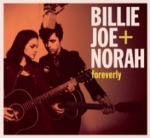Billie Joe Armstrong & Norah Jones – Foreverly (Music Review)

Billie Joe Armstrong & Norah Jones – Foreverly
I’ve seen some other reviews of Foreverly, and it seems that they all follow the same pattern. First of all, they point out the unlikeliness of the concept. Green Day’s Billie Joe Armstrong is joined by Norah Jones to make a faithful track-by-track adaptation of an obscure Everly Brothers album. Then the review says that surprisingly, they do a good job of it: The unlikely duo harmonizes nicely, and the songs are good.
I think that this is maybe letting the performers off easily. These are wildly successful music stars, and “they don’t sound bad” is pretty faint praise. The Everly Brothers’ Songs Our Daddy Taught Us was itself a collection of traditional country songs, and not necessarily an inspired list of choices. They beat you over the head with the emotional manipulation that was a country cliché a few generations back: There’s the song about a little boy’s dying wishes, the song about the little boy traveling to visit his dying mother, the song about the dying mother hoping to find her son before she goes, and so on. If The Everly Brothers had recorded this album thirty years later, it would’ve been all “my woman left me and my dog died” songs, and today it would be truckin’ and country checklists. We’re looking back at this album a half century later, so it’s a little more palatable than the modern clichés, but it’s still too much.
They’re good songs. Not one is wrong for a mix like this, but including them all is a little much. I would have much rather seen Armstrong and Jones put together their own collection of country standards, including just a few of these. Their performance is heartfelt and pleasant, and it does do justice to the sensibilities of past generations. It also strikes a nice balance between the washed-out production of 1958 and the loud production of 2013. I’d be happy to see what else they could do in this vein, but the only justification for this particular choice of songs is reverence for an album that wasn’t even notable at the time.
I know I’m probably being a little harsh on Foreverly, maybe in response to the uncritical praise. It’s an improvement on Songs Our Daddy Taught Us, it successfully brings two music stars into a new genre, and it will introduce a new audience to some deserving songs. But compared to the many versions of these songs already available, there is nothing outstanding here, and it doesn’t make a good case for why this genre still deserves attention. It’s pleasant, I listened to it several times, and I like the way this team works together. I hope they make something more inspired in the future.
Grade: C+








